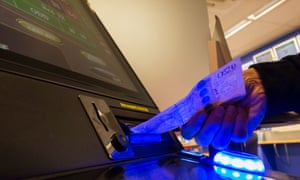
A man feeds a £20 note into a fixed-odds betting terminal. A government review of regulation of gambling machines will be published on Tuesday.
Photograph: Islandstock/Alamy
Sport betting
Force all gambling firms to pay levy for addiction treatment, says charity
Betting companies are failing to honour pledge to donate to care, says leading charity GambleAware
Gambling firms are failing to honour a pledge to donate part of their income to fund addiction treatment and should be forced to do so by law, the UK’s leading problem-gambling charity has said.
GambleAware told the Guardian it had lost patience after companies’ failure to pay left it facing a funding shortfall that risked undermining its efforts to help addicts.
The charity’s intervention comes before Tuesday’s publication of a long-awaited government review into the regulation of gambling machines and advertising.
The Department of Culture, Media and Sport review is expected to recommend that the maximum £100 stake on fixed-odds betting terminals (FOBTs) be reduced due to concerns about their links to addiction.
But GambleAware said that, regardless of the review’s outcome, firms should be made to pay a statutory levy devoted to helping problem gamblers.
The call was partly spurred by a cashflow crisis that forced it to notify the industry regulator, the Gambling Commission, in August that it might not be able to pay for its work, which includes funding the UK’s only specialist problem-gambling clinic.
The chief executive, Marc Etches, said this showed that the industry had yet to demonstrate that it was “sufficiently willing to meet the current [funding] target, much less that it [was] minded to voluntarily meet the increased funding that will be necessary to improve research, education and treatment services”.
“On this basis, GambleAware has determined that it would wish to see the introduction of a statutory levy.”
All bookmakers, bingo halls and online betting companies agreed to give 0.1% of their revenues to charity voluntarily, as part of a deal struck with the last Labour government when it deregulated gambling in 2007.
GambleAware, which regulators, MPs and the industry have since agreed should administer the donations, said firms were falling short, despite the recent spotlight on their commitment to tackling addiction.
While the suggested 0.1% donation would have yielded £13.8m last year, GambleAware asked for a more modest £10m to fund its nationwide activities but received only £8m. It warned that the industry was falling even further behind, having given only £4m so far this year, triggering the charity’s cashflow concerns.
Tom Watson, Labour’s deputy leader, said this was “simply not acceptable”, backing GambleAware’s calls for a mandatory levy. “Bookies pay lip service to responsible gambling but they aren’t doing enough to address the UK’s hidden gambling epidemic,” he said. “It is now clear that legislation is needed to force them to pay their fair share. Words are no longer enough.”
GambleAware believes treatment costs are likely to rise after the number of problem gamblers hit 430,000, less than 2% of whom are getting help.
As part of its tougher stance, the charity will reveal companies’ donations from next year and ask them to self-certify their contribution by publishing a figure.
The charity has previously accused companies of making “nominal” donations – as little, even, as £1.
Earlier this year, the Guardian asked gambling companies to reveal how much they had donated in the previous financial year.
Most leading high-street bookmakers matched or exceeded the 0.1% figure, with William Hill giving £1m, Mecca Bingo owner Rank donating £753,000 and Ladbrokes and Gala Coral, which have since merged, giving a combined £1.4m.
Several well-known gambling brands, including Paddy Power, Betfair and 888, said they donated but would not say how much, while several other companies did not return requests for comment.